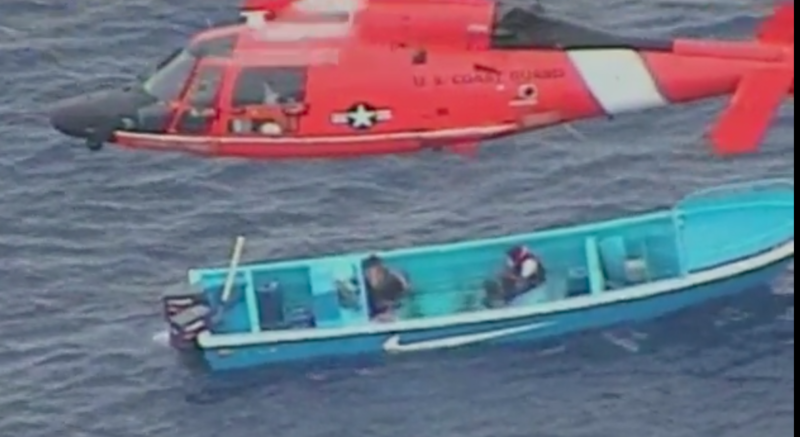A new generation of fast, radar-evading outboard boats is being used for drug smuggling in the Eastern Pacific Ocean, where the Coast Guard has intercepted seven of the vessels since June and seized more than 22,850 lbs. of cocaine worth over $306 million.
Dubbed low-profile vessels by the Coast Guard, the boats are a newer tactic beyond the stealthy but slower semisubmersible drug vessels seen in 2015-2016. The new boats ride lower in the water for a reduced radar signature, are powered by multiple outboard motors, and painted to blend in with the sea surface.

A low-profile drug smuggling boat intercepted by the Coast Guard in the Eastern Pacific June 22, 2017. Coast Guard video image.
One low-profile boat was intercepted in late May 2016, before this summer’s wave. A 54’x6’ example intercepted June 22 resembled an old fashioned surfer’s longboard, with a small enclosed pilothouse aft and four outboard engines. A similar craft stopped Aug. 14 several hundred miles off Central America carried a four-man crew and was laden with more than 6,000 lbs. of cocaine.
“The information gleaned from these Coast Guard interdictions provides insight into the pathways of illicit trafficking and contribute to the arrest and extradition of high-level drug cartel kingpins and follow on interdictions,” said Vice Adm. Fred Midgette, commander for the Coast Guard Pacific Area.
All the low-profile vessel interdictions occurred in known drug transit zones in the Pacific Ocean off the coast of Central and South America. Coast Guard officials say putting more U.S. and allied forces in the Eastern Pacific, coupled with increased coca production in South America, has led to a significant increase in narcotics removal in the drug transit zones.

U.S. Attorney General Jeff Sessions and Coast Guard Commandant Adm. Paul Zukunft at an offloading of seized drugs in San Diego Sept. 20, 2017. Coast Guard photo.
During fiscal year 2016, the Coast Guard set the U.S. record for most drugs ever seized, capturing more than 443,790 pounds of cocaine worth $5.9 billion. The Coast Guard is on track for another historic haul of more than 455,000 lbs. worth $6.1 billion by the time the 2017 fiscal year ends Sept. 30.
To publicize that benchmark, the Coast Guard offloaded 50,550 lbs. of cocaine and heroin worth an estimated $679.3 million at San Diego’s 10th Avenue Marine Terminal Wednesday. In a photo op with armed guards and drug bales for a backdrop, U.S. Attorney General Jeff Sessions and Coast Guard commandant Adm. Paul Zukunft praised 25 seizures made since Aug. 2.
“This record-breaking year by our Coast Guard saw the arrest of more than 600 suspected drug traffickers and kept nearly half a million pounds of dangerous drugs from getting to our streets--and ultimately to our neighbors, friends and families,” said Sessions. “I commend every service member who has helped us in our mission to keep the American people safe, and I thank them for this indispensable contribution to public safety.”

A lancha carrying three crewmen and 700 lbs. of cocaine is boarded by the Coast Guard several hundred miles off Mexico Sept. 6, 2017. Coast Guard video image.
Apart from the low-profile boats specially built by drug cartels, drugs are still transported by an assortment of conventional craft too. One Sept. 6 seizure several hundred miles southwest of Acapulco, Mexico, video recorded by the Coast Guard showed the three-man crew of an outboard-powered lancha stopping after warning shots from a helicopter, dumping their cargo, then waiting with their hands raised for a boarding.
The 700 lbs. of cocaine from that incident was part of the display at San Diego. But in candid testimony to Congress, Zukunft and other Coast Guard leaders say U.S. and allied authorities know from intelligence that many smuggling venture get through because there are not enough ships in the right place at the right time to stop them.




